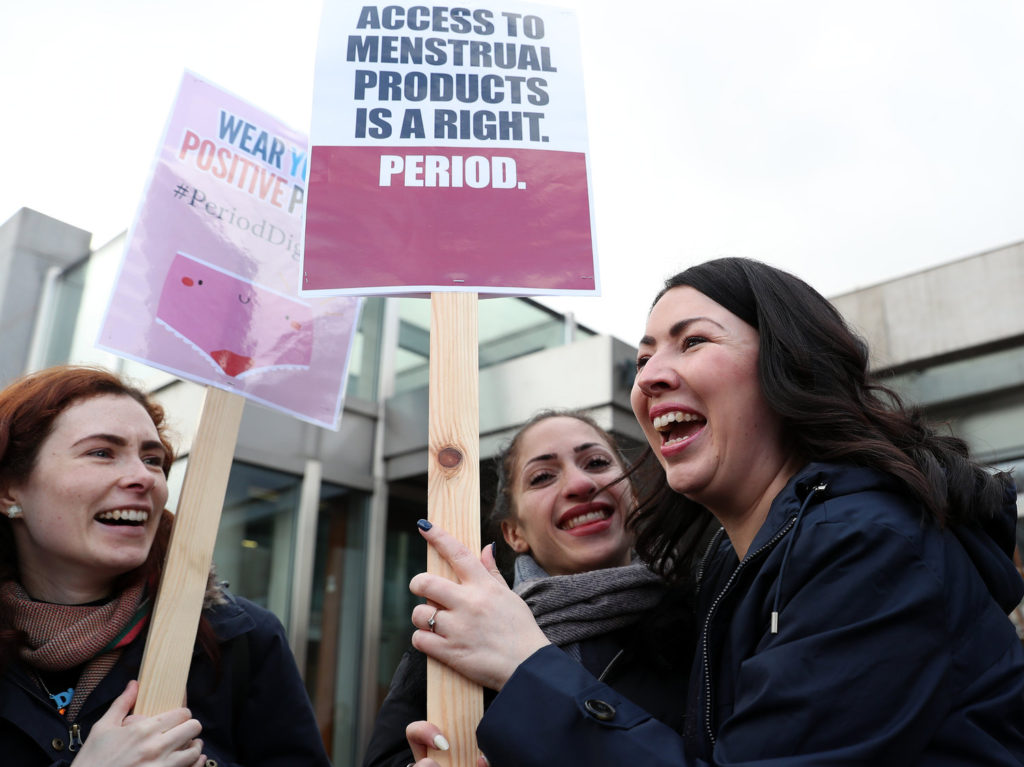
Scotland’s Period Products Bill
On 25 February, 2020, Scotland took a huge step in fighting period poverty. The Period Products (Free Provision) Bill passed the first stage by a vote of 112-0. This legislation would establish a legal obligation for the Scottish government to make period products available for free. The bill details the provision of products including pads and tampons and support for women suffering from endometriosis. Monica Lennon first introduced this bill in 2017 and has built a strong campaign since then. Above all, the two-hour debate concerning this bill was remarkable since menstruation is still a topic rarely discussed in public.
Scotland has made strides in gender equality by addressing the period issue. In 2018, a government scheme was implemented to provide free sanitary products in every school, college and university. The same year, three female fans of the Celtic Football Club started a campaign. “On the ball” appealed for the provision of free sanitary products at the stadium. This effort was successful as sanitary products were available at the stadium within weeks. These measures taken in Scotland mark the beginning of eradicating global period poverty.
What is Period Poverty?
Period poverty is a global sanitation issue caused by the absence of menstrual hygiene. This includes the lack of access to period products, waste disposal, toilets and handwashing facilities. There are many risks to poor menstrual hygiene which could be fatal if repetitive or prolonged. Some of these risks include urinary tract infections, toxic shock syndrome and cervical cancer. This can cause serious developmental issues in adolescent girls. This is an issue that impacts developing and developed nations alike. Furthermore, women who live in poverty and those with special needs are especially vulnerable.
Seems like, period poverty has also largely impacted a girl’s education. It was ranked the top reason girls would miss school in the United States. In developing countries, girls customarily stop going to school and remain uneducated. A 2014 report called Spot On! discovered that nearly 23 million girls in India dropped out of school annually. Moreover, younger women who do not receive proper education are more likely to enter arranged marriages. They are at risk of facing domestic violence and pregnancy complications at a developing age.
Stigma, Taboo & Myth
Menstruation is a biological process that occurs every month for 2-7 days. However, men and women around the world are still uneducated about this topic. Therefore, they do not talk about it enough with each other or with their children. Many myths have ostracized women and girls from carrying out basic activities. They cannot enter places of worship or eat certain foods. Some Middle-Eastern countries consider this a taboo issue, banning any media related to it. In some countries, girls do not learn about menstruation until the day of their first period.
In rural areas of countries like India and Nepal, women and girls are forced to live in exile during their time of the month. They live in small “menstrual huts” with poor sanitation and ventilation. However, it is dangerous to discredit this issue to this degree. It demotivates girls and women to maintain proper gynecological health. Especially if there was a problem, they would be ashamed to approach a medical professional.
A Period Of Change
Menstrual hygiene is a global health issue that highlights the lack of sanitation in a region. However, the past decade has seen tremendous progress in tackling this issue. While Scotland is at the fore-front of this battle, other countries are quick to follow. In 2020, England made all period products freely available at schools and colleges. The United States is undertaking this issue state-by-state. Boston public schools initiated a “menstrual equality” initiative in 2019, providing free menstrual products. The New Hampshire Senate passed SB 142 – requiring menstrual hygiene products in school restrooms. Nepal banned the practice of menstrual huts and has been working on enforcing the law.
I am especially proud of the period movement in India that has helped break an age-old taboo. The pioneer of this movement was Arunachalam Muruganantham, also known as Pad Man. In 1999, he learnt about the unhygienic menstrual practices in his village and set a goal. He wanted to make low-cost sanitary pads available to rural women. People ridiculed and shunned him from his village for constantly mentioning a taboo. By 2006, he successfully built a machine that manufactured pads at ⅓ of the cost. But he did not stop there. He installed machines in villages across India, making low-cost pads available in 23 out of 29 states.
A movie was made based on his inspirational story – “Pad Man” (available on Netflix). It also led to greater period awareness across the nation. Netflix also released a documentary “Period – End of Sentence”. It shed light on the serious menstrual hygiene issue in rural India. In 2018, only 12% of the menstruating population in India had access to sanitary products. If broken down to the rural population, this statistic lowers to 2-3% There is a long way to go to completely eradicate period poverty in India. However, India is advancing in period awareness by proactively dealing with the taboo around menstruation.
Spreading The Period Power
We are past menstruation being a ladies issue. This is certainly a global sanitation issue and we need to deal with it likewise. If toilet paper is freely available in all bathrooms, sanitary products should be too. There needs to be no shame in people talking about menstruation. We therefore need to educate our children, both boys and girls about this. This way, we won’t ridicule adolescent girls when they are going through this major development. Countries are at different stages of making this provision for its population. Social media has allowed women to share their #periodproblems and not feel isolated about this. I must say, it is refreshing to see us move towards a world eradicated of period poverty.

About The Author
Deepa Chandrachud recently completed her Bachelor’s degree in Finance from Bentley University. She is deeply passionate about gender equality and hopes to use this platform to create more awareness about issues pertaining to women’s rights.
Some other blog posts you might like:
Image Source: NPR
Editor: Dr. Shruti Kapoor